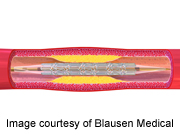
TUESDAY, Aug. 21 (HealthDay News) — A newer generation, drug-releasing stent led to fewer adverse cardiac events, such as heart-related death or heart attack linked to the same artery, than bare metal stents did among heart attack patients, a new study shows.
Stents are tiny mesh tubes surgically implanted to open arteries.
Swiss researchers noted the newer drug-emitting stents may also help patients avoid the chronic inflammation associated with early-generation drug-releasing stents.
“Newer-generation drug-eluting stents with biodegradable polymers provide controlled drug release,” the study authors explained in the Aug. 22/29 issue of the Journal of the American Medical Association.
Led by Dr. Lorenz Raber, of Bern University Hospital, the research team compared the safety and effectiveness of stents that released the drug biolimus from a biodegradable polymer, against bare metal stents that did not release a drug.
The study involved almost 1,200 patients in Europe and Israel who had a type of heart attack known as ST-segment elevation myocardial infarction (STEMI). Nearly 80 percent of the patients were men, and the average age was 61 years.
The participants were randomly assigned to receive the drug-releasing stent or the bare metal stent. They were examined one month after their artery opening procedure, and again at 12 months. The researchers determined the effectiveness of the stents by measuring rates of adverse cardiac events, including cardiac death and other heart problems.
The investigators found that at one year, 4.3 percent of patients who received the drug-releasing stents experienced major adverse cardiac events, compared to 8.7 percent of patients who received bare metal stents.
These findings represent a significant 4.4 percent absolute reduction and 51 percent relative reduction in the risk for major adverse cardiac events, the researchers pointed out in a journal news release.
Use of the new drug-releasing stent also resulted in reduced risk for cardiac death. At one year, rates of clotting within the stent were about 1 percent among patients with the drug-releasing stents, compared to just over 2 percent among patients who received bare metal stents.
“Our results suggest better clinical outcomes in terms of major adverse cardiac events of a stent releasing biolimus from a biodegradable polymer compared with a bare metal stent for the treatment of patients with STEMI,” the study authors concluded.
Another expert agreed.
“Newer generation drug-eluting stents which are currently FDA-approved in the United States have been shown to be superior to bare metal stents in decreasing event rates at one year when used for [heart attack],” said Dr. Barry Kaplan, vice chairman of cardiology at North Shore University Hospital in Manhasset, N.Y. “This trial is further proof that drug-eluting stents used in heart attack patients lead to superior results,” he added.
And Kaplan noted that, compared to bare metal stents, the drug-releasing models had fewer dangerous events at one year, including re-closure of the artery or clotting within the stent.
But, he added one caveat.
“The relative comparison between the biolimus-coated stent used in this study versus [other] currently available second-generation drug-eluting stents [available in the United States] still needs to be determined,” Kaplan said.
More information
The U.S. National Library of Medicine has more about stents.

